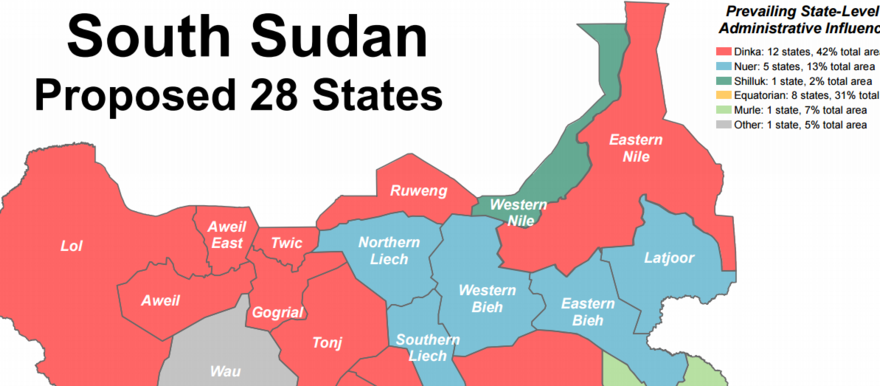A proposal by President Salva Kiir to divide the country into 28 states would make his own ethnic group the prevailing ethnic majority in administrative areas covering 42% of the country, according to maps of the proposal.
By comparison, in the current situation, the Dinka are the prevailing ethnic group in only 26 counties, approximately 25% of total land area, according to maps available for download below.
Considerable areas that presently belong to ethnically diverse states would be governed by new states comprising predominantly ethnic Dinka populations, for example, Raja County, Maban County and part of Makal County.
On the other hand, some Dinka-inhabited areas that were hitherto part of ethnically diverse states would be transferred into predominantly Dinka states, notably, Pigi County.
A map produced by the presidency to explain its 28-states proposal indicates the partial absorption of the Nuer-inhabited Uror County into an otherwise entirely Dinka-inhabited state and the largely Murle-inhabted Boma State.
Part of Nuer-inhabited Rubkona County would be absorbed into the new Dinka-inhabited Ruweng State; both areas have hitherto been part of the multi-ethnic Unity State.
Raja County is the largest territory that would be transferred into a Dinka-majority state, the proposed Lol State. Currently the county belongs to Western Bahr al Ghazal State, in which the Dinka are an ethnic minority. Under Kiir’s proposal, the county would be merged with two areas of Northern Bahr al Ghazal, radically shifting the ethnic balance in the state.
Meanwhile, the proposal for creation of 21 states by Riek Machar similarly creates advantages for his own ethnic group, the Nuer. Most notably, the Dinka area of Baliet County in present-day Upper Nile State would be merged into Nuer-dominated Sobat state.
The existence of a Dinka minority in present-day Unity State would remain unchanged under Machar’s proposal, whereas in Kiir’s proposal this minority would be given its own state administration.
Under Machar’s proposal, the Dinka minority in Pigi County would find itself isolated within a Nuer-dominated Phow State; presently the county is part of the multi-ethnic Jonglei State, in which there are other Dinka tribes in the southwest of the state around Bor.
The former vice president’s proposal would consequently result in an increase in predominance of his own ethnic group from 15% of total land area to 19% of total area.
Machar has also proposed that the minority Maban be merged with a new ‘Adar State’, which is otherwise Dinka-inhabited. At present they are part of the ethnically diverse Upper Nile State, which is dominated by no single group.
Both the proposal of Salva Kiir and the proposal of Riek Machar result in increased administrative influence of the Dinka and Nuer and less influence for smaller tribes.






